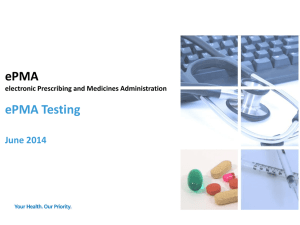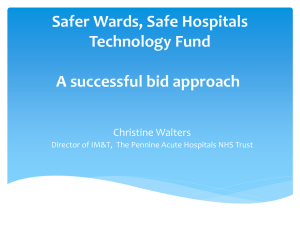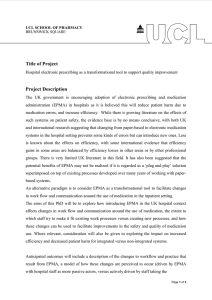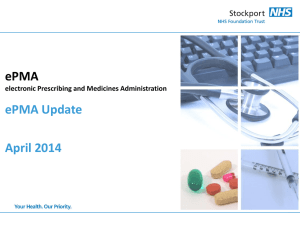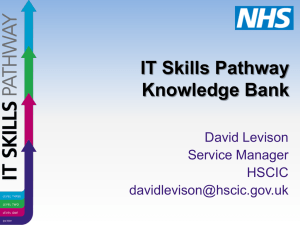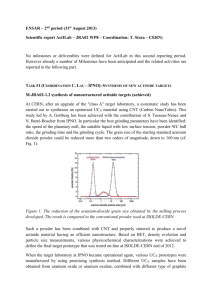EPMA Approaches to Training – Masterclass Presentation
advertisement
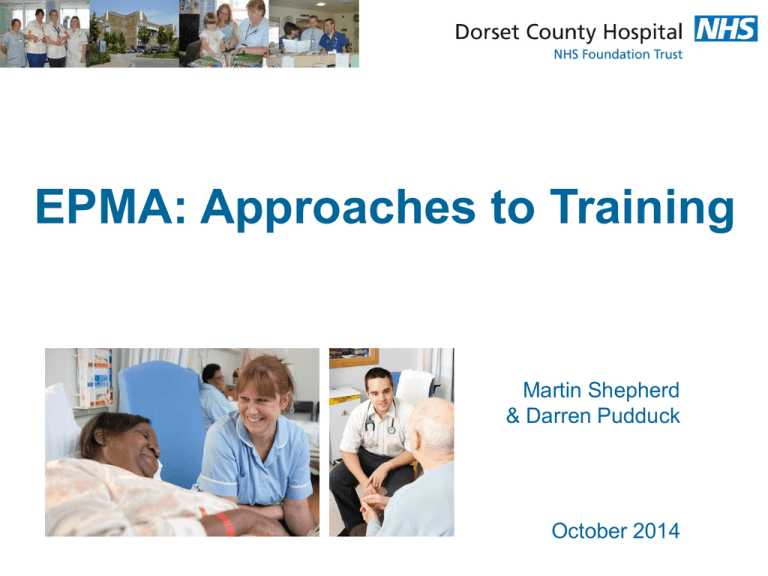
EPMA: Approaches to Training Martin Shepherd & Darren Pudduck October 2014 About DCH Dorset County Hospital is a small DGH with approximately 400 beds, seven operating Theatres, two Day Surgery Theatres, Paediatrics, Maternity, SCBU, ICU/HDU & E.D. We are the main provider of acute hospital services to a population of around 210,000, living within Weymouth and Portland, West Dorset, North Dorset and Purbeck. We also provide renal services for patients throughout Dorset and South Somerset; a total population of 850,000. DCH & EPMA • DCH has been a user of the JAC Pharmacy System for Pharmacy stock control and accounting purposes for more than two decades. • We have been using JAC for electronic discharge (eTTA only module) for over three years. • Full EPMA rollout using the JAC system started in May 2014 following a successful ‘Tech Fund’ bid. • EPMA is now ‘live’ in twelve inpatient locations. It is planned to have EPMA active in all DCH inpatient areas by the end of December 2014. • Next steps – Emergency Department & Outpatient prescribing. EPMA Training: lessons learned • Recognise that each user has a preferred learning style. - 1:1 training vs. eLearning vs. ‘on the job’ training. • Some users initially have relatively poor general ICT skills e.g. keyboard & mouse skills. • Prescribers and nurses have different needs. • Don’t forget non-medical prescribers and other professions (e.g. Dieticians, SALTs, Ward Clerks, Health Care Assistants). • Bank staff, Agency workers and locums are problematic - Plan ahead by checking eRostering and working with the Bank Office and Agencies. • eLearning package has been invaluable. •Our experience has been that a good percentage of users do not require any further support, however some require a short period of 1:1 following completion of eLearning. EPMA Training: lessons learned • Obtain full list of staff and ensure as many as possible are trained before ‘go-live’ in each area (but not too long before!). • Small number of users need greater support for a longer period. • Train on the same hardware that users will actually be using. • Provide extended hours support for each ward as they go live with EPMA (e.g. for each drug administration) for at least a week. • Pharmacy staff need as much training & support as ward staff. • On-call 24/7 required. • Expect the unexpected! EPMA eLearning • We obtained an online learning package from another Trust* who adapted it for our use on a commercial basis. * With thanks to Royal Cornwall NHS Trust • Made available internally (intranet) and externally (internet) – the latter permitted access by Agency & Bank staff. •The package has three modules: – Prescribers – Nurse administration – Anaesthetists • Each module has several sections and each section consists of a video demo followed by an interactive scenario. • Online assessment (pass mark 80%) on completion of module with results emailed to EPMA team (used as trigger to send out username/password). • If you have the time and resources to produce this ‘in house’ this is preferable so the configuration shown matches your own exactly. Other training tips • Short ‘User Guides’ available on intranet in PDF format. • EPMA Team meet with ward managers and other key stakeholders to promote eLearning and demo the system 1:1 before go-live. • Make use of ward and departmental meetings (e.g. CG or educational sessions) to promote EPMA and training. • Drop in sessions in high traffic areas (e.g. staff restaurant). • Software vendor provided services of Project Manager for ‘awareness day’. • Use Windows ‘remote desktop connection’ to assist users remotely. • Remember to include Consultants and utilise ‘Clinical Champions’. • Promote completion of EPMA eLearning as recordable CPD ‘credit’. • Utilise ICT Clinical Change team (if you have one).
